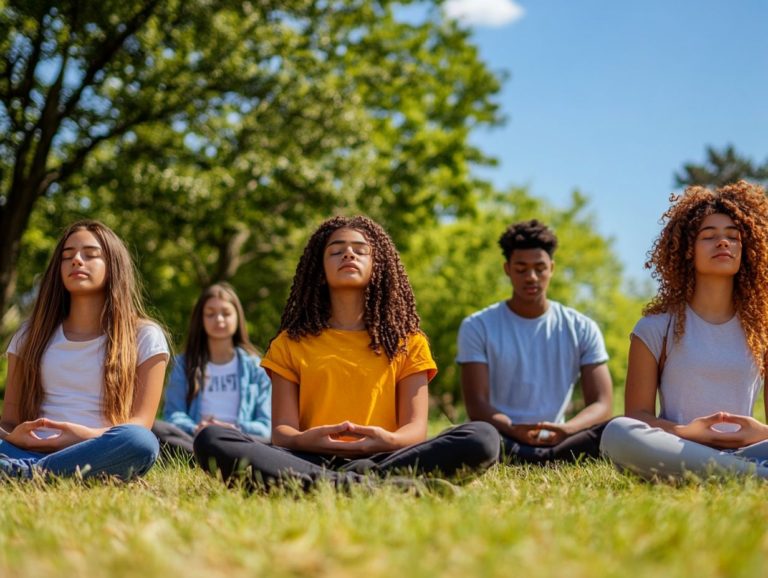7 Simple Mindfulness Techniques for Everyday Life
In today s fast-paced world, securing moments of peace and clarity can often feel like an uphill battle. Mindfulness presents a refreshing path for you to reconnect with yourself, enhance your mental health and overall well-being, and cultivate a deeper appreciation for the everyday experiences that surround you.
This article delves into seven simple mindfulness techniques ranging from breathing exercises to mindful journaling that can seamlessly integrate into your daily routine. Discover how these practices not only improve your mental health and well-being but also enrich your life in profound and meaningful ways.
Dive in to uncover practical insights and tips for weaving mindfulness into the very fabric of your busy life.
Contents
- Key Takeaways:
- 1. Breathing Exercises
- 2. Mindful Eating
- 3. Body Scan Meditation
- 4. Gratitude Practice
- 5. Mindful Walking
- 6. Visualization Techniques
- 7. Mindful Journaling
- How Can Mindfulness Improve Overall Well-Being?
- Mindfulness: A Powerful Tool for Enhancing Mental Health
- Frequently Asked Questions
- Mindfulness Techniques for Everyday Life
Key Takeaways:
1. Breathing Exercises
Breathing exercises are essential mindfulness practices that can significantly enhance your mental health by promoting relaxation, reducing stress, and fostering a deeper connection to the present moment. By engaging in mindful breathing techniques, you can cultivate a sense of calm and tranquility, effectively managing anxiety symptoms and improving your overall well-being. These exercises are a fundamental component of mindfulness meditation, serving as a bridge to more advanced practices.
Consider techniques such as diaphragmatic breathing, where you breathe deeply into your diaphragm rather than shallowly into your chest. This approach activates your body s relaxation response, allowing stress to simply melt away. Similarly, the 4-7-8 breathing technique where you inhale for four seconds, hold your breath for seven seconds, and exhale for eight can create a profound sense of peace.
Integrating these techniques into your regular mindfulness meditation practice not only enhances your focus and clarity but also equips you with practical tools to manage anxiety symptoms in everyday situations. Ultimately, this contributes to a more balanced emotional state, giving you the power to navigate life with greater ease and mindfulness benefits.
2. Mindful Eating
Mindful eating is a transformative practice that invites you to fully immerse yourself in each meal, fostering a heightened awareness of taste, texture, and sensations that ultimately enhances your mental health and well-being. By concentrating on the present moment during your meals, you can nurture a healthier relationship with food, alleviating anxiety symptoms associated with eating while cultivating a profound sense of gratitude and mindful awareness.
Experts like Dr. Hemisha Patel Urgola highlight the importance of paying attention to your hunger cues, which helps you differentiate between true physical hunger and emotional cravings. When you savor each bite, you unlock a deeper appreciation for flavors and aromas, enriching your dining experience. Research indicates that those who practice mindful eating often report lower stress levels and improved emotional regulation and stress management.
By incorporating techniques such as eating slowly and minimizing distractions, you can not only relish your meals more fully but also foster healthier eating habits, ultimately leading to better overall health outcomes and mindfulness benefits.
3. Body Scan Meditation
Body scan meditation is an invaluable mindfulness practice that allows you to cultivate a deeper connection with your body, fostering relaxation and enhancing your overall mental well-being. This technique encourages you to focus on different parts of your body, promoting mindful awareness of sensations and releasing built-up tension. It’s especially beneficial for reducing stress and managing symptoms of anxiety.
To begin, find a comfortable position whether sitting or lying down that allows you to center yourself. Gradually shift your attention from your toes to your head, taking note of any sensations you encounter, all without judgment. This gentle focus helps you identify areas of discomfort or tightness, encouraging a vital practice of self-compassion which means being kind to yourself during tough times and mindful awareness.
Research published in journals like Frontiers in Psychology reveals that regularly engaging in body scan meditation can significantly alleviate symptoms of anxiety and depression, making it a powerful tool for anyone facing mental health challenges and stress reduction.
Dedicating just a few minutes each day to this practice can lead to a greater sense of calm and clarity, ultimately enhancing your emotional resilience over time. Clinical psychologist Cassandra Vieten emphasizes the long-term benefits of such relaxation techniques.
4. Gratitude Practice
Incorporating a gratitude practice into your daily routine can profoundly enhance your mental health, helping you appreciate what you have and sharpening your awareness of life s positive aspects. This mindfulness exercise shifts your focus from anxiety and stress to hopeful reflections, boosting your emotional resilience and overall mental well-being.
A wonderful way to embark on this journey is by keeping a gratitude journal where you can jot down the things you appreciate each day. This simple yet powerful tool not only solidifies those positive thoughts but also cultivates a habit of reflection.
Expressing appreciation directly to others whether through a heartfelt message or a spoken word can strengthen your social bonds and elevate your mood even further. Engaging in mindful listening during these interactions can also heighten your emotional connection and understanding.
Research from esteemed institutions like Princeton University has shown that regular gratitude practices can significantly improve emotional states, reducing feelings of depression and anxiety while promoting a greater sense of happiness and connection.
By implementing these strategies, you will cultivate a vibrant and joyful outlook on life.
5. Mindful Walking

Mindful walking is a beautifully accessible form of mindfulness practice that invites you to connect with your surroundings while cultivating awareness with each step you take. This simple yet profoundly effective exercise enhances your experience of the present moment, offering a treasure trove of benefits such as improved mood, reduced anxiety, and a deeper appreciation for the world around you.
By weaving mindful walking into your daily routine whether during a lunch break, a morning stroll, or even your commute to work you can effortlessly merge movement with mindfulness. As you fully engage with the sights, sounds, and sensations that accompany your journey, you create a unique opportunity for reflection and grounding. This practice fosters a sense of calm and nurtures deeper connections with nature and your environment.
To enrich this experience, consider focusing on the rhythm of your breath, feeling the texture of the ground beneath your feet, or observing the gentle sway of trees and clouds. Over time, you may find that mindful walking significantly enhances your mental well-being and stress reduction, providing a much-needed respite from the stresses of everyday life.
6. Visualization Techniques
Visualization techniques are essential in your mindfulness toolkit. They allow you to harness your imagination to create mental imagery that promotes relaxation and enhances mental health.
You can easily integrate these techniques into your mindfulness meditation practice. For instance, when you practice guided imagery, you may envision tranquil landscapes, which can boost relaxation.
Research in JAMA Psychiatry shows that visualization methods effectively lower stress and enhance coping strategies. These practices can bring you immediate relief and help build long-term resilience, giving you the power to navigate life s challenges with a more positive outlook.
7. Mindful Journaling
Mindful journaling is a powerful practice that encourages you to express your thoughts and feelings on paper. This activity promotes a deeper understanding of your mental health challenges and fosters mindful awareness of your experiences.
Using techniques like writing prompts allows you to explore specific feelings or events. Additionally, creating gratitude lists helps you focus on positive experiences, enhancing your outlook.
Mental health professionals, including Dr. Hemisha Patel Urgola, encourage these practices. Regular journaling aids in processing emotions and boosts self-awareness, empowering your journey towards better mental health.
How Can Mindfulness Improve Overall Well-Being?
Discover how mindfulness can transform your life today! Engaging in mindfulness practices, such as mindfulness meditation, breathing exercises, and mindful movement, can significantly enhance your overall well-being. These techniques are known for their ability to improve mental health, reduce stress, and foster a balanced emotional state.
Research from sources like Frontiers in Psychology suggests that adopting these practices helps you be more aware, empowering you to manage anxiety symptoms more effectively and navigate the daily challenges that life throws your way.
Cassandra Vieten, a leading researcher at the UCSD Center for Mindfulness in California, highlights that participation in mindfulness meditation can lead to meaningful changes in brain structure and function. Studies have shown an increase in gray matter density the amount of brain tissue that helps with thinking and emotions in areas of the brain linked to emotional regulation and self-awareness, showcasing the profound impact of these practices.
Controlled trials published in JAMA Psychiatry have shown that regular mindfulness practice can lower cortisol levels the stress hormone leading to a more tranquil demeanor. Many participants have reported enhanced relationships and increased life satisfaction, illustrating that the advantages of embracing mindfulness extend well beyond the individual, positively affecting their interactions and connections with others.
What Are the Benefits of Incorporating Mindfulness into Daily Life?
Incorporating mindfulness into your daily life brings a wealth of benefits, including improved mental health, enhanced stress reduction, and a greater capacity for emotional regulation. By practicing mindfulness regularly, you can cultivate a heightened sense of present moment awareness, which paves the way for a more fulfilling and balanced lifestyle.
Research backs this up, revealing that mindfulness practices significantly enhance focus and concentration, enabling you to engage more deeply in tasks and make more effective decisions. Establishing a mindfulness routine has also been linked to greater emotional resilience, allowing you to navigate adversity with patience and clarity.
In fact, a study published in the Journal of Happiness Studies found that mindfulness meditation can significantly reduce anxiety symptoms, promoting a profound sense of calmness and well-being. These advantages come together to foster healthier relationships, greater overall life satisfaction, and an improved ability to cope with life s stressors, similar to the effects seen with medications like escitalopram.
How Can One Practice Mindfulness in a Busy Schedule?

Practicing mindfulness amid a busy schedule is not only possible but can also be elegantly woven into your daily routine through quick exercises and techniques that yield significant benefits for your mental health and stress management. By dedicating just a few moments to mindfulness, you can cultivate a sense of calm and clarity, even in the midst of chaos.
Consider incorporating simple practices like mindful breathing, where you take a few deep, intentional breaths, or performing a body scan to increase your awareness of physical sensations. These techniques can profoundly impact your state of mind. They only require a couple of minutes, yet when consistently integrated into your day, they can enhance your focus and emotional stability. The key is to set an intention whether it’s to pause during a hectic workday or to ground yourself before sleep.
By fostering a routine that revolves around these brief moments of mindfulness, you can establish lasting habits that promote your overall well-being and potentially improve insomnia.
Mindfulness: A Powerful Tool for Enhancing Mental Health
Mindfulness isn’t just a buzzword it’s a powerful tool for enhancing mental health and well-being. Let s explore common misconceptions, potential risks, and how to easily integrate mindfulness into your daily routine.
What Are the Common Misconceptions About Mindfulness?
Despite the rising popularity of mindfulness, a number of misconceptions continue to linger, such as the notion that mindfulness is merely about emptying your mind or that it demands extensive time commitments. These myths can hold you back from discovering the profound benefits mindfulness offers for mental health.
By grasping the true essence of mindfulness, you can seamlessly weave these practices into your daily life, according to research from Behavioral Sleep Medicine. Mindfulness is far from a futile exercise in achieving mental blankness; it actually invites you to acknowledge and observe your thoughts and feelings without judgment.
This practice cultivates a richer awareness of both your surroundings and your internal experiences. You don t need hours of unoccupied time to dive into mindfulness; even a few minutes dedicated to focused breathing can provide remarkable emotional and psychological benefits.
Research from SELF highlights that engaging in short mindfulness exercises sometimes as brief as a couple of minutes can effectively reduce stress and enhance focus, shattering the myth that mindfulness is only for those with an abundance of free time. Start reaping the incredible rewards of mindfulness today, regardless of how hectic your schedule may be.
What Are the Potential Risks of Mindfulness?
While mindfulness practices present many benefits, it s crucial to recognize that they may also carry potential risks. For some individuals, particularly those grappling with underlying mental health issues, mindfulness can sometimes amplify anxiety or lead to emotional discomfort.
Consider this: if you have a history of trauma, certain mindfulness techniques might inadvertently stir up painful memories or feelings that can be challenging to process without appropriate support. If you tend to experience anxiety, meditation may trigger a whirlwind of racing thoughts, resulting in increased distress rather than the intended calm.
Thus, it s vital for you to practice self-awareness and tune into your mental and emotional states while engaging in mindfulness. Should you discover that these practices are intensifying your anxiety or disrupting your mental serenity, seeking the guidance of a mental health professional can offer valuable insights and equip you with the tools needed for a healthier, more balanced approach.
How Can One Incorporate Mindfulness in Different Aspects of Life?
Incorporating mindfulness into various aspects of your life is a transformative journey that can significantly enhance your mental health, improve your relationships, and foster a deeper connection with yourself and others.
By embracing mindfulness practices in your daily activities, you can cultivate a lasting sense of presence and purpose. Take the workplace, for instance. Just a few moments dedicated to pausing and focusing on your breath can alleviate stress during those hectic times, allowing you to tackle challenges with newfound clarity.
Similarly, when engaging in conversations with loved ones, practicing active listening focusing entirely on the speaker to understand their message better without distractions can deepen your understanding and strengthen your bonds.
For self-care, consider simple activities like mindful walking or truly savoring your meals; these can lead to a greater appreciation for life s simple pleasures. By seamlessly weaving these practices into your daily routine, you can create a more harmonious existence that nurtures your personal growth and fosters supportive connections.
Frequently Asked Questions
What are the benefits of practicing 7 Simple Mindfulness Techniques for Everyday Life?

By incorporating these techniques into your daily routine, you can reduce stress and anxiety, improve focus and concentration, and increase overall feelings of well-being and contentment.
How can I find time to practice these techniques in my busy schedule?
You can easily integrate these techniques into your daily routine, such as during your morning routine, while commuting, or before bed. It only takes a few minutes to practice mindfulness, and the benefits are worth it.
In summary, mindfulness is a valuable practice that can enhance your life in many ways. By addressing misconceptions, recognizing potential risks, and incorporating mindfulness into everyday activities, you can significantly improve your mental well-being.
Mindfulness Techniques for Everyday Life
What are some examples of 7 Simple Mindfulness Techniques for Everyday Life?
Some examples include deep breathing exercises, mindful eating, body scan meditation, gratitude practice, and mindful listening. You can adapt these techniques to fit your personal preferences and needs.
Do I need any special equipment or training to practice these techniques?
No, you can practice these techniques anywhere and at any time without any special equipment. If you’re new to mindfulness, attending a class or watching tutorial videos can help.
How often should I practice these techniques to see results?
Consistency is key! Practicing these techniques daily for at least a few minutes yields the best results. Even a few moments of mindfulness throughout the day can positively impact your overall well-being.
Can I combine these techniques with other self-care practices?
Yes! You can easily add these techniques to your self-care routine to boost the benefits of other practices. For example, practice deep breathing while taking a bath, or practice gratitude during your yoga session.
Experts agree that these integrations can greatly enhance your mental health!







